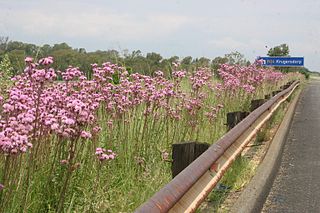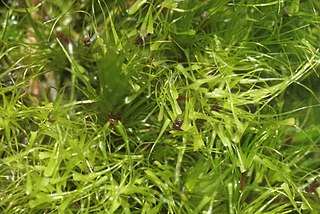
Delphinium is a genus of about 300 species of annual and perennial flowering plants in the family Ranunculaceae, native throughout the Northern Hemisphere and also on the high mountains of tropical Africa. The genus was erected by Carl Linnaeus.

Ledum was a genus in the family Ericaceae, including 8 species of evergreen shrubs native to cool temperate and subarctic regions of the Northern Hemisphere and commonly known as Labrador tea. It is now recognised as a subsection of section Rhododendron, subgenus Rhododendron, of the genus Rhododendron.

Cenolophium is a genus of flowering plants in the carrot family Apiaceae (Umbelliferae). Its only species is Cenolophium denudatum, native to Europe and Asia. A herbaceous perennial, it grows to 1.5 m (4.9 ft) tall by 0.5 m (1.6 ft) wide, with dark green divided leaves and, in summer, many umbels of tiny pale green or white flowers on branching naked stems. The stems are sometimes purple in colour. The flowers are attractive to numerous insects.

Tachigali denudata, synonym Sclerolobium denudatum, is a species of legume in the family Fabaceae. It is found only in Brazil.

Bream Wood is a 7.8-hectare (19-acre) biological Site of Special Scientific Interest north of Crowborough in East Sussex.

Tetramerium is a genus of plants belonging to the family Acanthaceae. It is found mainly in the Americas, especially in tropical dry forests. Christian Gottfried Daniel Nees von Esenbeck first described the genus in 1846 after collecting two species on the journey of HMS Sulphur.

Lachnocladium is a genus of clavarioid fungi in the family Lachnocladiaceae.

Syed Ziaur Rahman is a permanent member of 'Board of Trustees' and Chair of the Advisory Council, International Association of Medical Colleges (IAOMC). He also serves as elected secretary of IAOMC and Society of Pharmacovigilance, India (SoPI).

Leucobryaceae is a family of haplolepideous mosses (Dicranidae) in the order Dicranales.

Seseli is a genus of herbaceous perennial plants in the family Apiaceae. They are sometimes woody at base with a conic taproot. Leaf blades are 1–3-pinnate or pinnately decompound. Umbels are compound, with bracts few or absent. Petals are white or yellow, and the fruit ovoid or ellipsoid.

Delphinium denudatum is a species of wildflower in the genus Delphinium, native to Central Asia.

Gonostoma is a genus of bristlemouths.

Eupatorium macrocephalum Less. aka pompom weed, is a cosmopolitan perennial plant belonging to the family of Asteraceae and regarded as an invasive weed in some countries. It is native to the southern United States, Central America, South America and was introduced to South Africa. It is classed as a principal weed in Brazil. In South Africa it has been cultivated as an ornamental, is often found on roadsides, and has become of concern for its invading of undisturbed climax grassland and wetlands since the 1960s. It is closely related to Siam weed, and is one of some 268 species in the genus.
Rhabdocaulon is a genus of plants in the family Lamiaceae, first described as a genus in 1936. It is native to South America.
- Rhabdocaulon coccineum(Benth.) Epling - southern Brazil
- Rhabdocaulon denudatum(Benth.) Epling - Brazil
- Rhabdocaulon erythrostachysEpling - southern Brazil
- Rhabdocaulon gracile(Benth.) Epling - southern Brazil
- Rhabdocaulon lavanduloides (Benth.) Epling - southern Brazil
- Rhabdocaulon stenodontum(Briq.) Epling - southern Brazil, Paraguay, northeastern Argentina
- Rhabdocaulon strictum(Benth.) Epling - southern Brazil, Uruguay, northeastern Argentina

Rhododendron denudatum (皱叶杜鹃) is a rhododendron species native to northwestern Guizhou, southwestern Sichuan, and eastern Yunnan in China, where it grows at altitudes of 2,000–3,300 m (6,600–10,800 ft). It is a shrub or small tree that grows to 3–6 meters in height, with leathery leaves that are elliptic-lanceolate to ovate-lanceolate, and 10–16 × 2.5–5 cm in size. Flowers are rose-colored with deep crimson flecks.

Gymnocalycium denudatum is a species of Gymnocalycium from Brazil.

Dicranodontium is a genus of mosses belonging to the family Dicranaceae.
Odontoschisma is a genus of liverworts belonging to the family Cephaloziaceae.
Chaenostoma is a genus of flowering plants belonging to the family Scrophulariaceae.
















